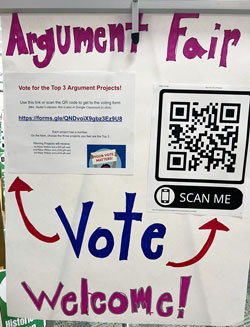Wyoming — Eighth-grader Teagyn Ager was awarded for arguing at Wyoming Junior High.
“School should start later. Students would get the proper amount of sleep and it would improve attendance rates and ability to learn,” Teagyn said, explaining the argument she presented on a poster for the school’s first-ever Argument Fair.
Teagyn won first place in the competition, hosted recently by English teacher Katie Sluiter in the media center. Teagyn’s project — presented in marker with clear, concise writing and colorful illustrations — offered well-sourced information including the parts of an argument: claim, evidence, counterclaim, rebuttal and call to action.
‘I have never seen some of these kids work so hard on a school assignment for me.’
— eighth-grade English teacher Katie Sluiter
Her evidence: the human sleep hormone, melatonin, doesn’t rise in teens until 11 p.m., but it’s recommended that teens get eight to 10 hours of sleep per night. Sleeping from 11 at night until 7 in the morning is the correct amount of sleep, she said, but schools start too early to get up at 7 a.m.
“A survey of 29 high schools across seven states showed having a later start time improved all of the attendance rates,” Teagyn said.
Wyoming Public Schools administrators, staff and students voted on the top 25 argument projects, five from each class, which were displayed anonymously. The top three winners, Teagyn, Lucy Renteria and a student who wished to remain anonymous, won $10 gift cards for places of their choice.
Taking a Stand
Sluiter said the fair was an attempt to increase engagement in a unit on writing arguments, an eighth-grade standard. In the past, she has assigned argumentative essays, and students have struggled. “I was like, what can we do that’s not a paper? I started thinking of other contests you have: science fairs, art fairs … What if we did it with that end in mind, that they are going to display it? I was able to focus on the parts of an argument without the essay format overwhelming them.”

Students chose their topics, ranging from school-focused to major social issues. Groups of students checked each other’s work and chose the top five in their class. Topics included gun rights and gun control, trans athletes, workplace abuse, abortion, food delivery at school, study hall, climate change, adding Wednesday as a day off from school, shortening the school day, and allowing vending machines in school.
“I have never seen some of these kids work so hard on a school assignment for me,” Sluiter said.
Lucy argued that schools should have more field trips. “People who go on field trips score higher on end-of-grade exams, were absent less often and had fewer behavioral problems,” Lucy said, citing Edutopia.
Teagyn said she liked having the chance to compete with her peers.
“It lets us put creativity into it and gets us motivated to work toward something, rather than thinking it’s just a grade.”













